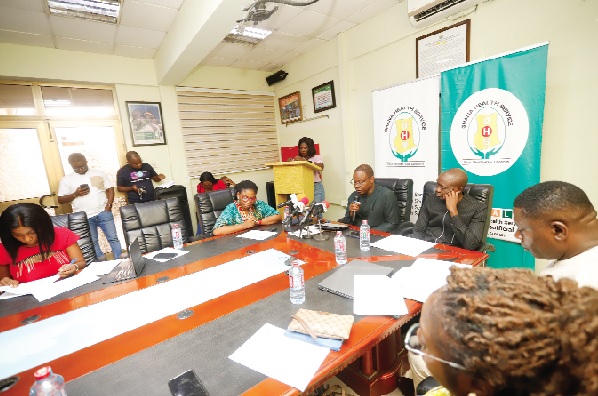Over two million school-age children between five and 14 years have been targeted for a deworming exercise scheduled from Monday, October 28 to Sunday, November 3, 2024.
Up to 2.6 million of the targeted population are school-age children in both public and private schools in 100 districts in 15 regions.
About 1.6 million more people targeted for the exercise are community-based children and adults in 57 districts in 11 regions.
The deworming exercise dubbed the 2024 National School and Community Deworming Exercise, is a collaborative effort between the Ghana Health Service (GHS) and the Ghana Education Service (GES) to boost the health and immunity of school-age children.
It is aimed at eliminating schistosomiasis and to control soil-transmitted helminth (STH) infestations.
The Director-General of the Ghana Health Service, Dr Patrick Kuma-Aboagye, who announced the exercise at a media briefing in Accra yesterday, said the eligible children would be administered 600-milligram (mg) praziquantel and 400mg albendazole medicines during the exercise.
Those medicines, he explained, were donated to the GHS through the World Health Organisation (WHO), and would be administered under the strict supervision of specially trained school teachers and health workers.
Dr Kuma-Aboagye said it was important for all children to eat before taking the medicines, explaining that it would help in the effective absorption of the medication.
"Preferably, medicines should be administered immediately after the first break or after children have been served food to ensure that all children have eaten. Therefore, all parents, guardians and caregivers should ensure their children eat before going to school," he advised.
Schistosomiasis is a disease caused by parasitic worms that live in freshwater.
The infestation is more common in children in poverty-stricken areas due to poor sanitation and hygiene.
Environmental exposure to schistosoma-contaminated water is the primary mode of transmission in endemic areas.
Signs and symptoms of schistosomiasis include abdominal pain, diarrhoea, blood in urine and stool, liver damage, anaemia, malnutrition and decreased productivity.
Dr Kuma-Aboagye said female genital schistosomiasis was a severe consequence of a schistosoma infestation that occurred in girls and women, especially in endemic areas.
He stated that the condition always had a significant impact on the quality of life, including causing possible infertility, menstrual disorders and recurrent urinary tract infections.
For these reasons, he indicated that it was essential to increase awareness of schistosomiasis prevention among the public.
In Ghana, he said, schistosomiasis had an estimated country-wide prevalence of 23.3 per cent, with localised prevalence levels exceeding 50 per cent.
For soil-transmitted helminths, Dr Kuma-Aboagye explained that they were most prevalent in areas with poor sanitation, inadequate hygiene practices and low socio-economic conditions.
He mentioned its symptoms to include abdominal pain, diarrhoea, anaemia, malnutrition and impaired physical and reduced cognitive development.
Dr Kuma-Aboagye said it was important to eliminate schistosomiasis and control soil-transmitted helminth in Ghana to improve the overall health and well-being of the population.
The Director of the Public Health Division of the GHS, Dr Franklin Asiedu-Bekoe, urged the media to use their platforms to enlighten the public on the deworming exercise, raise awareness about its importance, and encourage individuals to participate fully.
The Director of the School Health Education Programme of the GES, Theresa Oppong-Mensah, gave the assurance that the schools were ready for the deworming exercise, adding that they had collaborated with the Ghana School Feeding Programme to ensure that enough food was provided on the day of the administration of the medicines.
“Parents have also been educated on it and they are also going to support us with water and food as well. This is to indicate that GES is ready, and we are fully in support of this exercise,” she said.
In a message from one of the partner agencies, the Programme Director of USAID Act to End NTDs Programme, Irene Dzathor, expressed the commitment of her outfit to the fight against schistosomiasis and soil-transmitted helminth elimination in Ghana.
Present at the media briefing was the Programme Manager of Neglected Tropical Diseases, Dr Joseph Opare.
Latest Stories
-
Election 2024: EC destroys defective ballot papers for Ahafo and Volta regions
2 mins -
2024 Election: I am sad EC disqualified me, but I endorse CPP’s candidate – PNP’s Nabla
28 mins -
I want to build a modern, inclusive country anchored by systems and data – Bawumia to CSOs
29 mins -
Miss Health Ghana 2024: Kujori Esther Cachana crowned new Health Ambassador
37 mins -
Livestream: The manifesto debate on WASH and climate change
43 mins -
Alan Kyerematen saddened by NDC and NPP’s neglect of Krofrom Market in the Ashanti Region
47 mins -
CSIR Executive Director urges farmers to adopt technology for improved farming
1 hour -
Football Impact Africa’s Ghetto Love Initiative inspires change in Teshie
1 hour -
Peter Toobu calls for tighter border security over uncovered weapons at Tema Port
1 hour -
Gov’t has failed its commitment to IPPs – Ablakwa
1 hour -
Sell Chrome to end search monopoly, Google told
1 hour -
KATH to install seven new dialysis machines by end of November
2 hours -
Walewale: Police confiscate 37 bags of cocoa beans suspected of being smuggled out of Ghana
2 hours -
‘Expired’ Rice Scandal: FDA confirms rice was safe for consumption after rigorous lab tests
2 hours -
Many women have experienced intimate partner violence – Angela Dwamena Aboagye
2 hours

